Get Involved
Observing Earth Day Every Day: Tips from WPC Staff
Each April, the world celebrates Earth Month and each April 22, Earth Day. Opportunities for engagement and action abound, ranging from advocacy and awareness to volunteering and strategic actions. At the Western Pennsylvania Conservancy, we encourage you to volunteer with us by planting gardens, creating trails or cleaning up local streams or rivers, and by donating to support our work.
In addition, we hope you consider other ways that you can make a difference in the health of our planet. To share some ideas and thoughts, staff members of the Western Pennsylvania Conservancy offer their own personal tips for observing Earth Month in your home and backyard, and they all want to remind you to “Make every day Earth Day!” Together, and with small and large efforts, we can conserve and nurture our water, land, forests and wildlife and help protect our natural home.
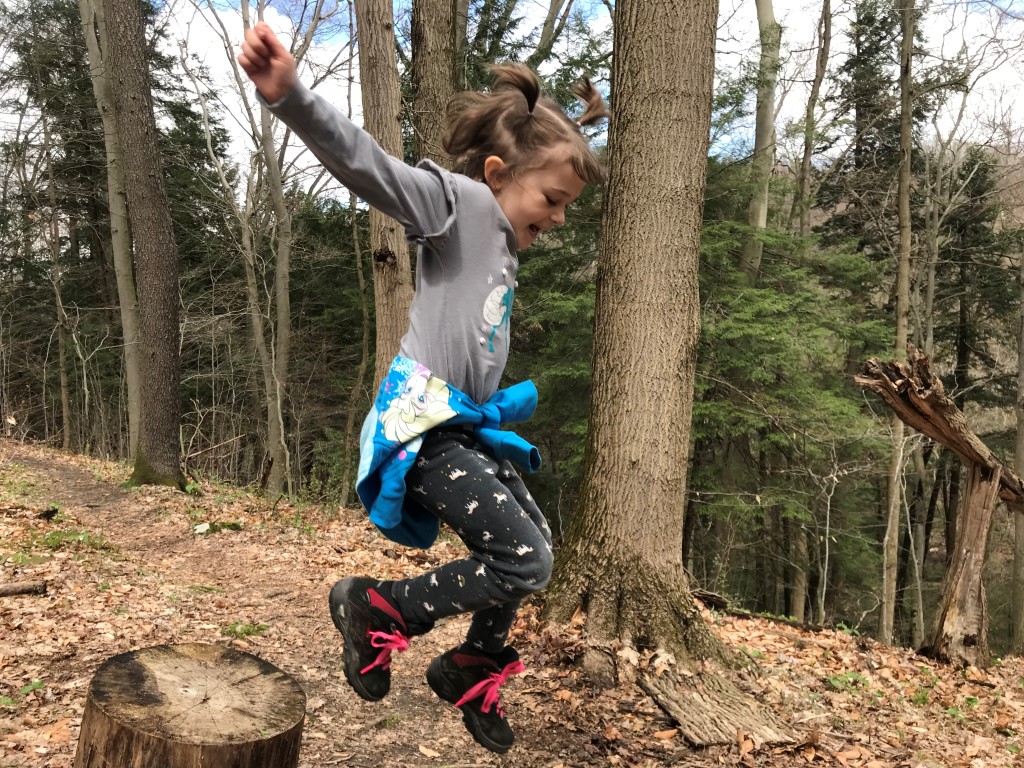
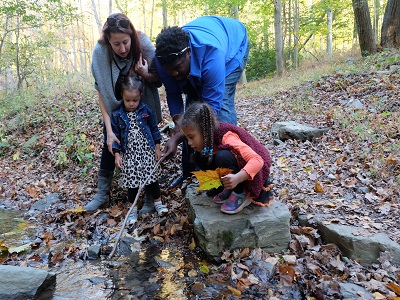
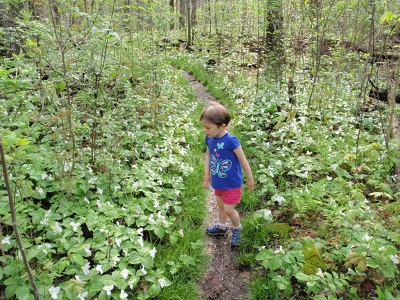
IN THE GREAT OUTDOORS
Visit an Outdoor Space You've Never Been Before
Amy Jewitt, invasive species coordinator, natural heritage program
Try something new! Make it a point to visit a natural area in your region that you've never been to before. The more we experience nature, the more we come to appreciate and enjoy it.
Western Pennsylvania offers numerous public natural areas to visit including state and local parks, rail trails, protected preserves, and many others. For inspiration on where to plan your next outing, consider visiting one of the 41 places protected by the Western Pennsylvania Conservancy, all of which are open to the public for various recreational activities. You can view a map of them here.
Pay Attention in Nature
Steve Grund, botanist, natural heritage program
Pay close attention! This is good advice in any context, but particularly in nature. That beetle on the sidewalk might have antennae that look cooler than moose antlers! The flowers on a bishop's cap has petals only a few millimeters long, and most people probably walk past them without realizing what exquisite beauty they are missing!
Get Outdoors, and Carry Out Your Trash
Andy Zadnik, director, land conservation and stewardship
Remember to get your prescribed dose of nature each day! If you can, visit our properties. When you’re hiking, take a bag along to carry out any of your trash and recyclables.
Spend Time with the Nature Around You
Jeff Wagner, director, natural heritage program
No matter where you live, birds and plants are always very close by. Spend a little time watching the leaves emerging from the trees, early wildflowers coming into bloom and birds beginning to pair off and nest. Look them up, learn their names. Maybe it will be the beginning of a new habit of paying attention to the life and nature that is all around us.
Turn Off the Treadmill and Get Out in Nature
Jen Kissel, communications specialist, institutional advancement
After using a treadmill or other electrically powered exercise device, remember to power them off to save electricity. Rather, head outside for fresh air to reduce your carbon footprint and reconnect with nature. If you live in Pittsburgh, try walking the numerous sets of city steps (and feel the burn!). Take a fresh look at the buildings, streets and roads in your own neighborhood or visit trails galore on our properties and in city, county and state parks.
Pull Invasives Plants While You Walk
Lorraine Kofalt, community greenspace services coordinator, Community Greening
Bring a bag on your walks and remove any invasive garlic mustard that you notice. Learn more about garlic mustard.
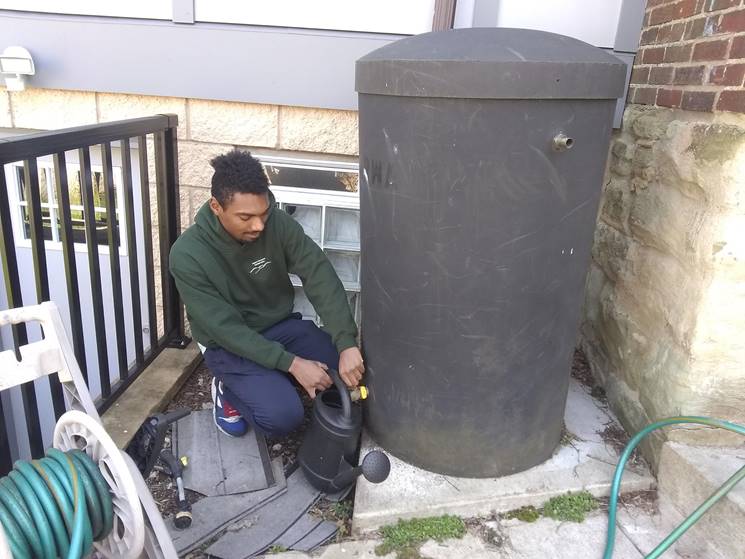
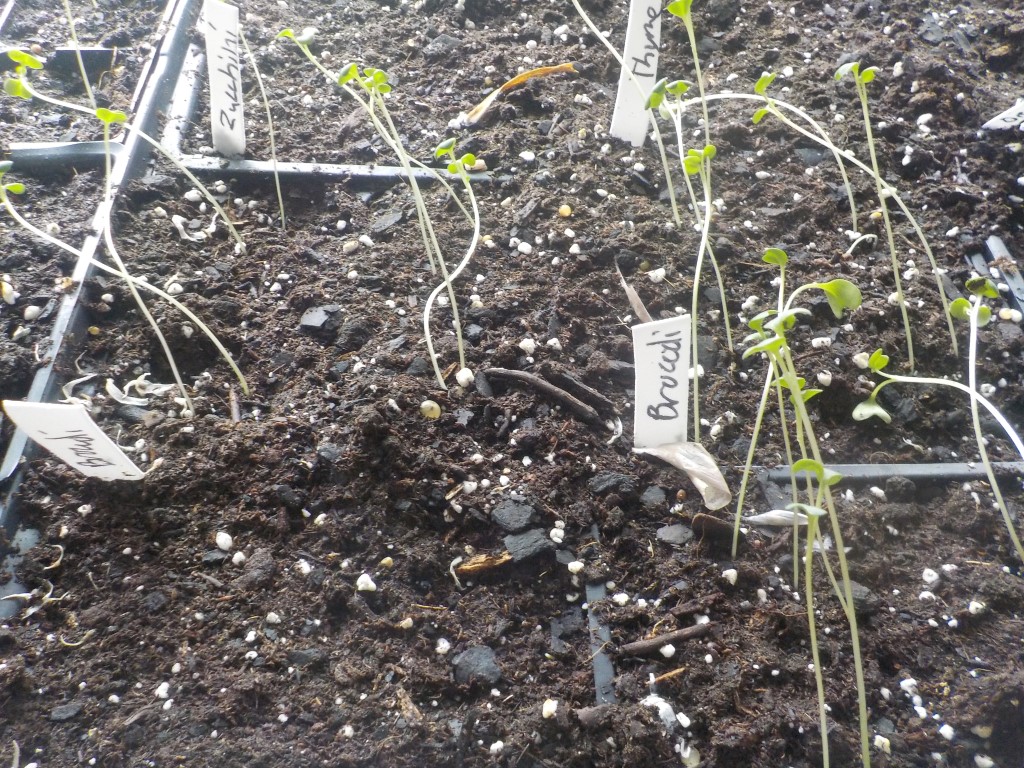
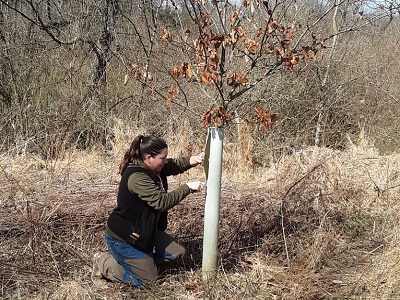
IN THE GARDEN AND YARD
Tend a Smaller Lawn
Claire Ciafre, ecologist, Pennsylvania Natural Heritage Program
Make your lawn smaller. You can replace parts of it with important habitat for native plants and animals, and you'll burn less gas when you mow.
Plant a Pollinator Garden
Amy Jewitt, invasive species coordinator, natural heritage program
One out of every three bites of food produced is grown with the help of bees, butterflies, beetles, bats and other small mammals and insects that pollinate plants. Plant a garden that helps support bees and other pollinators.
Grow Your Own Veggies and Create Recycled Garden Labels
Luke Bobnar, watershed scientist, watershed conservation
Grow your own vegetable garden! It helps reduce the carbon footprint of buying food from the store. The plants you grow help sequester carbon (at least temporarily and help clean the air.) And when I’ve put my own hard work into growing food, I’m less likely to waste it or create garbage to be landfilled. No need to purchase fancy labels for your garden or seed starter supplies. I grow seedlings in recycled cell packs, which I’ve reused for at least four years. I cut tabs for labeling out of a milk jug, then recycled the rest of the milk jug, so it’s a win on the gardening and a win on the recycling!
Plant a Container Garden
Jeff Wagner, director, natural heritage program
Grow some vegetables in a limited space. Many people have gotten out of touch with where their food comes from and how much energy it requires to ship food around the country and the world. Container gardens can be very productive and satisfying. What you produce will have a much smaller carbon footprint than say, a tomato from California.
Feed the Monarchs, Catch the Rain and Control Pests and Weeds Kindly
Lorraine Kofalt, community greenspace services coordinator, Community Greening
Add a few milkweed plants to your garden to provide food for monarch butterfly caterpillars. Install a rainwater catchment system, such as a rain barrel, to reduce storm water runoff on your property and your utility water usage. Here’s more information from GrowPittsburgh. Place pet or human hair around the base of plants to help safely deter deer and rabbits, and make an eco-friendly weed killer with Epsom salt, vinegar, water and dish soap.
Plant for Natural Pest Control
Matt Jenkins, field technician, Community Greening
Rudbeckia is a waterwise, low-maintenance plant that attracts beneficial insects like the Hooverfly, a bug that eats aphids and mealybugs. Deer avoid Rudbeckia, due to the texture of the plant’s fuzzy leaves. Spring is a great time to weed and mulch around Rudbeckia to give it a head start for the growing season.
Plant or Maintain Riparian Buffers to Improve Watershed Health
Alysha Trexler, watershed project manager, watershed conservation
I care for the riparian trees planted on my farm in Indiana County. The 20 acres of native streamside trees planted on my farm in 2008 were planted with the intention to improve water quality and provide valuable wildlife habitat. As the seedlings grew, time was spent removing shelters and enjoying the changes that happen with a growing riparian habitat.
I encourage all landowners that have had riparian buffers planted on their property to walk through the buffer to perform maintenance and see how wildlife uses the habitat. To learn more about riparian buffers visit our riparian webpage. Contact me at atrexler@paconserve.org to learn if a riparian buffer could be planted on your property.
Grow Windowsill Plants
Luke Bobnar, watershed scientist, watershed conservation
Caring for plants and knowing where your food comes from helps develop respect for it and our planet. For folks who live in an apartment or don’t have access to ground, growing a plant or herb on a windowsill, a wall-garden, balcony or rooftop can engender a sense of responsibility and stewardship.
Even if you’re caring for one small plant, you’re still caring for a living thing that is being productive, cleaning the air you breathe and adding natural beauty to your abode.
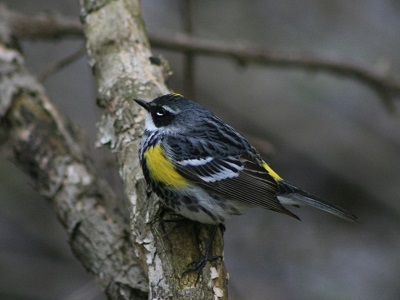
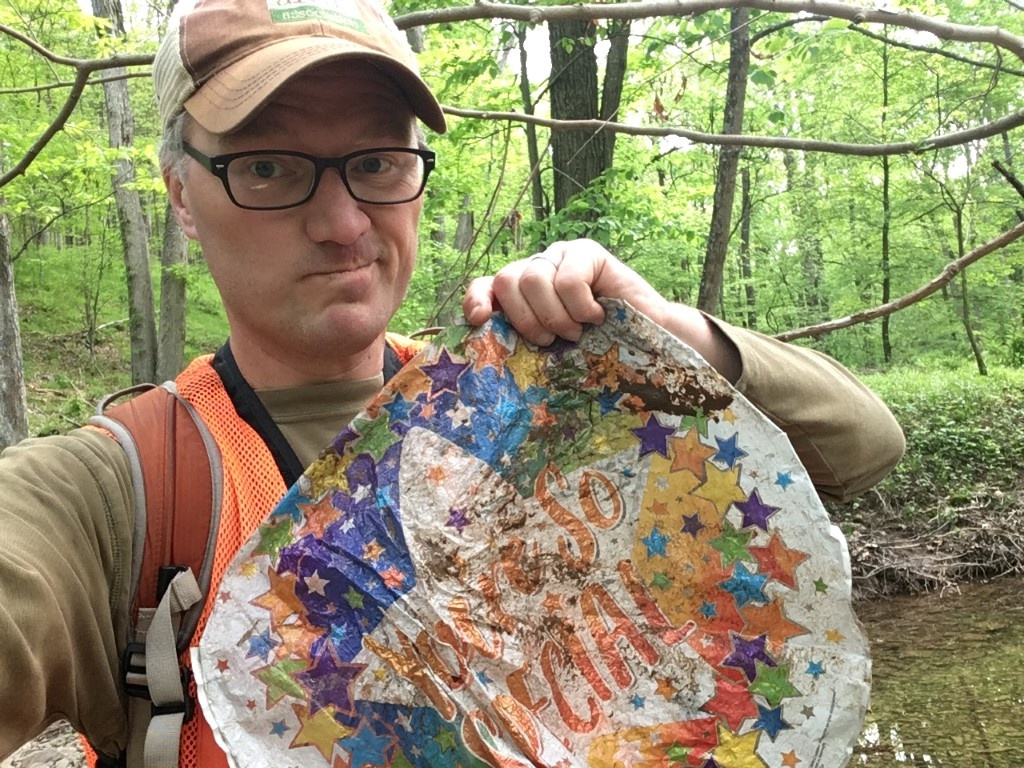
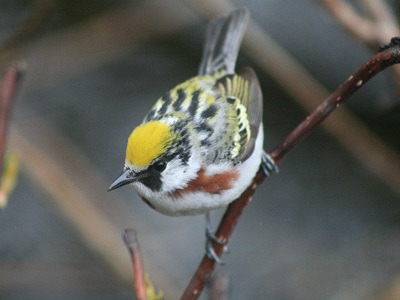
FOR THE BIRDS
Celebrate Without Balloons
Ephraim Zimmerman, science director, natural heritage program
Don’t release balloons to celebrate Earth Day, birthdays or any other event! They come back down as widely distributed bird-killing garbage. Sky lanterns are worse – they are on fire!
Take Action for Our Feathered Friends
David Yeany, avian ecologist, natural heritage program
I keep my pet cat indoors. It keeps him safe and the birds safer – outdoor cats kill an estimated 2.6 billion birds annually in the U.S. and Canada. This is second only to habitat loss as the top human-caused reason for bird declines. My wife and I purchase only shade-grown bird friendly coffee. About 75% of coffee farms worldwide grow their crops in the sun, causing the loss of natural forest habitat. Many of our migrant songbirds, like warblers, vireos and orioles benefit from shade-grown coffee preserves providing necessary wintering habitat. Learn how to buy bird-friendly coffee. Here are seven simple actions we can all do to help better conserve our feathered friends.
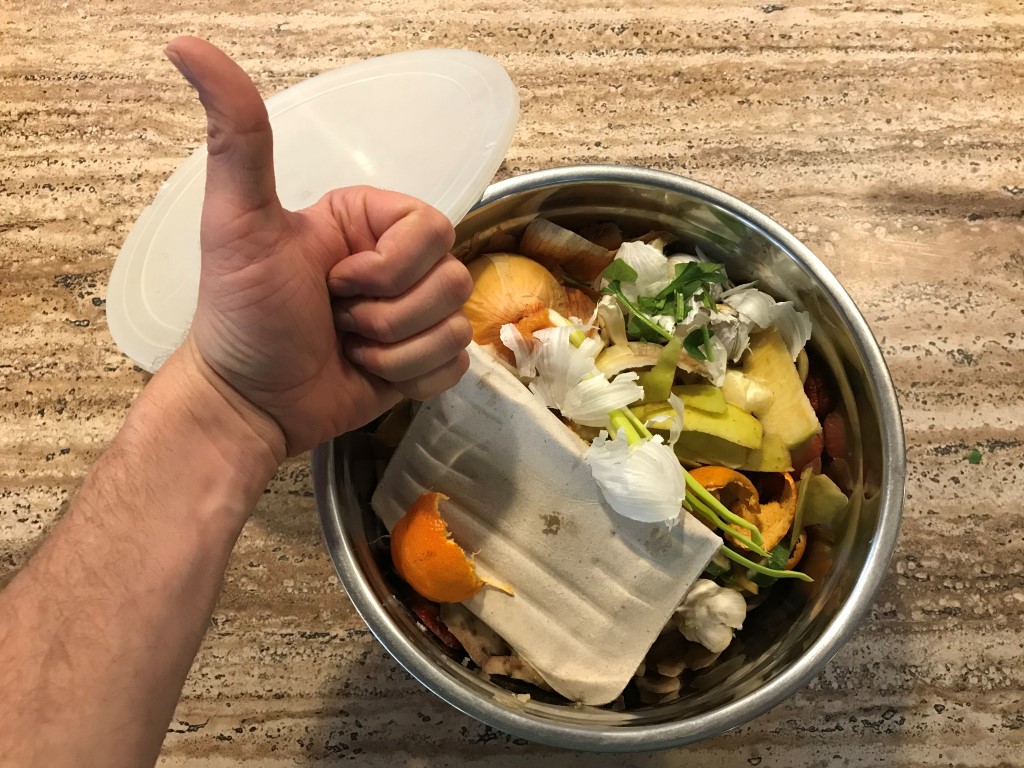
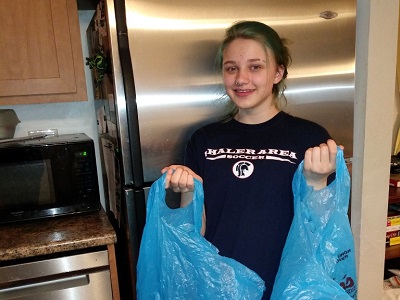

IN THE KITCHEN AND HOME
Making Do and Thinking Thrift
Jennifer Drayton, digital fundraising specialist, institutional advancement
I love that there is shift is taking place around clothes and household items -- that buying new or having more is not the first thought any longer. I hope this trend to mend clothes, to repurpose items (like my friend creating a hanging planter from an old purse) and shopping for used items continues. It is worth the effort. Kids' clothes and toys especially! It already exists...wear the dress again, pass it down, buy and sell at resale shops and remember that all this stuff is never really gone.
Make Your Own Baby Food
Amanda Pavlowsky, senior development officer, institutional advancement
Consider making your own baby food! Next time you’re at the grocery store or your local farmer’s market, pick up some fresh fruits and vegetables for your little one. Prepare each puree and freeze the mixture in labeled ice cube trays. This makes preparing a healthy meal for even your littlest family member so much easier during the week. It’s also a great way to introduce new foods without all the wasteful packaging.
Manage Leftovers and Put Worms to Work
Luke Bobnar, watershed scientist, watershed conservation
I try to eat leftovers in a timely fashion. This reduces waste, saves energy (no old containers in the back of the fridge wasting electricity by keeping cold a bucket of mold) and has led to some interesting dinners! I also send kitchen scraps to my chickens, which happily break them down mechanically and chemically. I compost their waste and bedding, which becomes next year’s garden amendment.
For those with limited space for composting kitchen scraps, self-contained, indoor worm composters might be a good option. Use your worm compost in your garden or planter pots.
Consider a Plant-based Lifestyle
Jen Kissel, communications specialist, institutional advancement
The benefits of eating more plants and fewer animal products are almost too numerous to list. In addition to creating a healthier you, eating partially or fully plant-based is one of the best gifts you can give our planet. Among other things, it significantly reduces water usage and carbon emissions. There are tons of informational resources, including this Case for Sustainability from UCLA and countless great recipe pages, including this one at the Physicians Committee for Responsible Medicine.
Learn to Compost
Kierstin Carlson, associate information manager, natural heritage program
Start a compost pile for your garden with leftover veggie and fruit scraps. Composting keeps valuable nutrients and fertilizer out of landfills and in your garden. At home I have plastic containers in my freezer where I store compost material until I am ready to take it out to my bin. No bugs and no smell! Visit Grow Pittsburgh’s composting page or take a class or compost at the Pennsylvania Resources Council.
Ditch the Plastic Plates and Utensils
Carmen Bray, director of communications, institutional advancement
Instead of using styrofoam or plastic straws, cups, bottles, plates and cutlery, invest in durable dinnerware that can be reused several times and use reusable cups and mugs with built-in straws and lids. And, of course, recycle all of that plastic once you get your new or used crockery. For my first apartment, my dear mother gifted me a used dinnerware set 20 years ago that I still use daily!
Donate Grocery Bags to Food Pantries
Jen Kissel, communications specialist, institutional advancement
When shopping, taking reusable cloth bags is a great option. However, sometimes we forget them, or the order is too large and we need to use some of the store’s bags. Reuse those bags for shopping, trashcan liners or pet waste. And, your local food pantries, which are experiencing an overwhelming demand, need for disposable bags. Please locate your local food pantry and donate your plastic and paper bags.
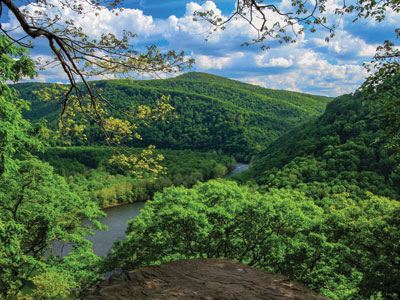
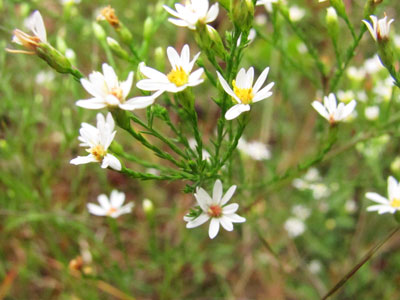
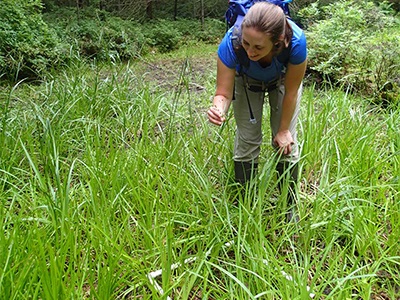
CONSERVE FOR NATURE
Consider Conserving Your Land
Jane Menchyk, Laurel Highlands land protection manager
On Earth Day, I personally reflect on where I have been and where I am headed and how I can leave the world a better place. Recently, one of our supporters was thinking the same. She had received a postcard from WPC with the title “CONTINUING YOUR FARM LEGACY.” She called me and the rest is history; on the 50th anniversary of Earth Day in 2020, the farm was officially protected and part of WPC’s Farmland Access Program. Contact us to learn about land conservation options for you and your land. Reach out at jmenchyk@paconserve.org and let’s chat! Happy Earth Day!
Reduce Printing and Recycle Paper
Carmen Bray, director of communications, institutional advancement
Think twice if you need to print something out on paper, and consider using your digital readers, tablets, computers and/or cell phones instead as a way to reduce paper printing and usage. And, of course, recycle all forms of paper. When the Conservancy prints publications, we only use FSC (Forest Stewardship Council)-certified paper, which means the paper is sourced from responsibly managed forests. After reading, please remember to share or recycle our printed publications as well.
Drive Less
Jeff Wagner, director, natural heritage program
If you have the ability to work from home, or to walk or bike to work, consider doing so. Making a choice to limit travel by car – even one day a week – can make a real contribution to improving air quality, reducing use of fossil fuels, reducing our carbon footprint and making for less congested highways.
Recycle Batteries
Kierstin Carlson, associate information manager, natural heritage program
Gather up spent batteries, electronics and other difficult-to-recycle or hazardous materials for safe recycling or disposal. Visit the Pennsylvania Resources Council webpage for information. WPC uses INMETCO in Ellwood City for battery recycling. They offer a prepaid box that you can fill with batteries and mail back for about $21.
Make Your Voice Heard and Vote
Nevin Welte, malacologist/nongame biologist, natural heritage program
The three biggest – and fairly simple – things to effect positive changes for the Earth include 1) emailing/calling your local/state/federal representatives with frequency about climate and conservation issues 2) voting in every local/state/federal election and 3) remembering that every day is Earth Day. Use this resource to find your legislator.
For More Information:
Western Pennsylvania Conservancy
800 Waterfront Drive
Pittsburgh, PA 15222
